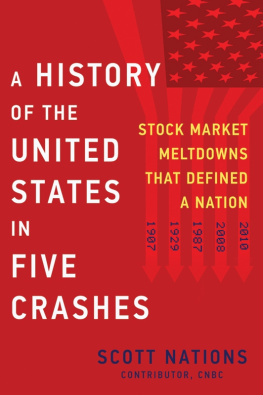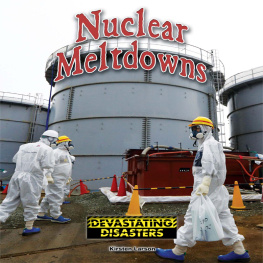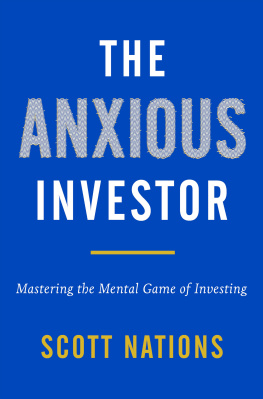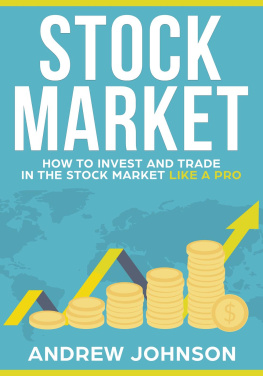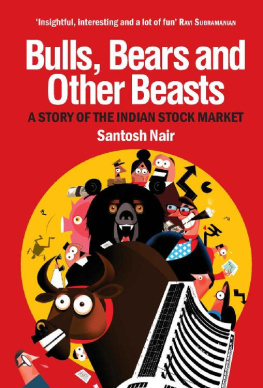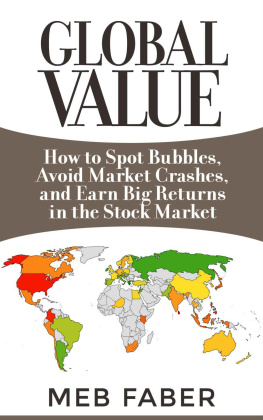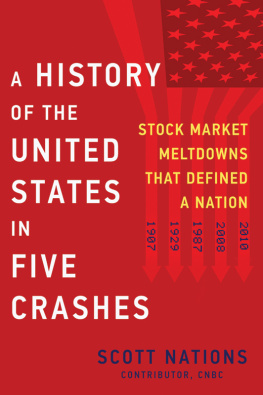Nations - A History of the United States in Five Crashes Stock Market Meltdowns That Defined a Nation
Here you can read online Nations - A History of the United States in Five Crashes Stock Market Meltdowns That Defined a Nation full text of the book (entire story) in english for free. Download pdf and epub, get meaning, cover and reviews about this ebook. year: 2017, publisher: William Morrow & Co, genre: Science. Description of the work, (preface) as well as reviews are available. Best literature library LitArk.com created for fans of good reading and offers a wide selection of genres:
Romance novel
Science fiction
Adventure
Detective
Science
History
Home and family
Prose
Art
Politics
Computer
Non-fiction
Religion
Business
Children
Humor
Choose a favorite category and find really read worthwhile books. Enjoy immersion in the world of imagination, feel the emotions of the characters or learn something new for yourself, make an fascinating discovery.
A History of the United States in Five Crashes Stock Market Meltdowns That Defined a Nation: summary, description and annotation
We offer to read an annotation, description, summary or preface (depends on what the author of the book "A History of the United States in Five Crashes Stock Market Meltdowns That Defined a Nation" wrote himself). If you haven't found the necessary information about the book — write in the comments, we will try to find it.
Nations: author's other books
Who wrote A History of the United States in Five Crashes Stock Market Meltdowns That Defined a Nation? Find out the surname, the name of the author of the book and a list of all author's works by series.
A History of the United States in Five Crashes Stock Market Meltdowns That Defined a Nation — read online for free the complete book (whole text) full work
Below is the text of the book, divided by pages. System saving the place of the last page read, allows you to conveniently read the book "A History of the United States in Five Crashes Stock Market Meltdowns That Defined a Nation" online for free, without having to search again every time where you left off. Put a bookmark, and you can go to the page where you finished reading at any time.
Font size:
Interval:
Bookmark:

For Wendi

CONTENTS

C rash. Its a kinetic and evocative word and dramatic and frightening. It means theres a story to be told, because when two cars collide or a plane plummets from the sky theres rarely a single cause. When the stock market crashes, vast sums are lost and peoples lives are changed, often drastically. But equally dramatic are the stories leading up to the crashes in the stock market, because amid the wreckage there are heroes, people who recognized the causes and catalysts and warned us of the immense drop looming or who did their best to stop it once it was in motion.
We invest in the stock market for many reasons, each of them good, including funding retirements and educations. The irony is that in funding our retirement we create new jobs. In financing educations we create more technology to learn about. The impact isnt felt just here; as those investments are deployed around the world, problems are solved, new industries are created, and international economies growthe American investor has probably done more good in this world than anyone else, with the exception of the American soldier.
The stories of markets, including of the modern stock market crashes, are ultimately fascinating personal stories. Some people saw the crashes coming, some unwittingly sped up the drop, some were more malicious, and some were just stupid or reckless.
Whats engrossing, and a bit scary, is that most of the people responsible for the modern stock market crashes thought they were operating in the public good. From a president who wanted more power for himself and less for malefactors of great wealth; to another public official who in an effort to help a friend fed a bubble that ultimately crashed; to academics who created an ingenious methodology that was supposed to wring most of the risk out of investing but instead manufactured an enormous new risk; to those who worked to make certain that every American could enjoy the satisfaction of owning his or her own home; and finally, to the ones who thought that automation would make trading less expensive and more efficientthose at the heart of these crashes were, without exception, warned that the courses theyd set were dangerous. Well read about the people and the warnings with the hope of learning to heed those warnings in the future.
But the subject isnt just one of personal intrigue. The impact on investors has been profound. If one had invested $1 in the Dow Jones Industrial Average on December 31, 1899, it would have grown to $156.88 at the close of trading on the day of the last modern stock market crash. If that investor had avoided just one day, October 19, 1987, the balance would instead be $202.71. If that investor had avoided the five worst days, that balance would be $319.24, more than doubling his or her return.
Unfortunately, stock market crashes cost more than just money. They breed fear that causes people to refuse to invest, making it nearly impossible to finance creation of those jobs and advancement of those economies. And they create other unforeseen but enthralling problems. For example, it was a loss of confidence and refusal to invest in the early 1970s that led to the creation of the contraption that fueled the crash of Black Monday, October 19, 1987. Well learn the entire story.
For all the protections we put in place, stock market crashes are a function of the way markets, and the men and women who run them, operate. And that human element of the stock market is what makes crashes endlessly fascinating and also creates a unique prism through which we can view the prologue to the next crash while it is still likely years away. But as time passes, we forget the lessons learned, and as the particulars change, we lose sight of the fact that crashes dont have a single cause that is easy to recognize before the damage is done. Instead every crash is caused by a unique confluence of usually personal events. Despite understanding this and despite our best efforts, its impossible to crash-proof our financial system, just as its impossible to eliminate automobile accidents. No matter how well engineered the car, no matter how conscientious the driver, someone will be human, perhaps when assembling one of the thousands of critical parts, or when operating one of the thousands of critical parts, or perhaps in a combination of both. Or perhaps the weather will just be bad or the other driver will be drunk.
Confirmation that our stock market will crash again can be found in the understanding that markets continue to crash, even though the five modern stock market crashes are strikingly similar and should teach us something. They share important phenomena, and some of them should be obvious to us, including steep appreciation in the stock market. Precisely how the market appreciates is common to the crashes; two-year periods of particularly aggressive buying inside a robust decade are common just before most of the crashes. Less obvious commonalities also appear, including new financial contraptions that we are (overly) confident we understand, only to learn that they inject uncertainty and leverage into the stock market at its weakest moment. The government also makes its appearance, often in an effort to eliminate a real inequity like competition-killing industrial monopolies or abusive leveraged buyouts. But the government often chooses the worst possible moment to intervene, having waited until the financial stresses are finally too much for their constituencies. When an external catalystoften natural or geopoliticalpushes the system past the tipping point the market crashes, and the warnings that are also common to each of the crashes seem remarkably prescient. Why didnt we listen?
Given the commonalities, how do we keep getting ourselves into situations in which we convince ourselves that this time its different? Often its the nature of the contraption that convinces us that much of the risk has been wrung out of the stock market.
In the 1920s the investment trust promised professional financial management and diversification, both of which were thought to reduce or eliminate risk, but instead the investment trusts increased risk. In the 1980s a wonder of complex mathematics known as portfolio insurance promised to provide a floor below which the value of a portfolio simply could not fall. Instead it increased the depth and velocity of the drop. Thirty years later, investment bankers and institutional investors were seduced by even more complex mathematics into believing that the value of mortgage-backed securities could not fall below a certain level.
While we watch these dangers build, the unknowable or unforeseeable element is the catalyst that will set it off. In 1907 it was as random as an earthquake, while in 2010 it was a riot in a place far away. Each of the catalysts initially seemed to have little, if anything, to do with finance. But our modern economies are intimately connected by financeinsurance in the case of an earthquake on our west coast or the price of crude oil and geopolitical turmoil in the Middle East, or the common European currency when it seems a country is dissolving into violence. These unpredictable catalysts take on critical financial importance.
The observable elements are necessary for a crash to occur but they arent sufficient. We should be able to recognize when a crash is possible even if we cant be certain one will occur. If a catalyst is never introduced, the result will likely be years of poor stock market returns rather than the lightning bolt that creates chaos that destroys the fortunes of people who dont know how they can recover.
Font size:
Interval:
Bookmark:
Similar books «A History of the United States in Five Crashes Stock Market Meltdowns That Defined a Nation»
Look at similar books to A History of the United States in Five Crashes Stock Market Meltdowns That Defined a Nation. We have selected literature similar in name and meaning in the hope of providing readers with more options to find new, interesting, not yet read works.
Discussion, reviews of the book A History of the United States in Five Crashes Stock Market Meltdowns That Defined a Nation and just readers' own opinions. Leave your comments, write what you think about the work, its meaning or the main characters. Specify what exactly you liked and what you didn't like, and why you think so.

